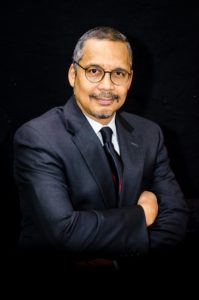1. What made you want to go into medicine?
I originally wanted to go into law. Growing up in Washington, DC during the civil rights movement made me want to get involved in making social changes. But I was always also interested in the sciences. How do things work? How do bodies work? During my undergraduate studies at Howard University I was actually a political science major working towards law school. But I couldn’t stop opening up the science books in the library! And I’m still that way. As a surgeon, whenever I open up a body, I’m always fascinated by the way it looks and how it works.
2. Your program on KET, Kentucky HEALTH, aims to improve health through education and awareness. What do you feel are the greatest barriers to patient education and access in Kentucky?
Kentucky HEALTH started for me when I first came to Kentucky and noticed the disparities in health outcomes. African-Americans and minorities in particular struggle with a host of health issues, but honestly the entire state does as well. I wanted to know how we could correct or improve this, and in my opinion, education is the best way to influence change. We’ve got to de-mystify healthcare, because an educated populous will be the best patients. Educated patients take ownership. I’ve been really lucky to work with KET on Kentucky HEALTH. We’ve had really good people help us, particularly the members of the physician community, who are willing to come on the show and share their expertise.
As for barriers, I think there’s a lot. Food insecurity. Environment. Crime. Proper housing. Social structures. If you’re hungry or are suffering from some kind of abuse, you’re not going to be thinking about your long-term health. You’re just going to be focused on surviving day to day. That’s part of the framework we have to look at as physicians.
3. You just became installed as president of the Greater Louisville Medical Society (GLMS). What would you like to see organized medicine do in the next few years?
I’d like to see us improve our communications with patients. How can we make our patients better patients and be more receptive to what they are saying to us in the confines of the limited amount of time that we have with them? I also think this will involve working together more effectively with the entire care team. When I went to medical school, my mother (a nurse) told me two things: first, don’t mess up a bed that a nurse just made, and second, listen to the nurses. The discussions they have with patients are different than the ones we as physicians have, and we need to learn to listen.
On the flip side, we need insurance companies to listen to us. Right now, we’re only being compensated for the outcome of a visit or procedure. We’re not being paid to address the surrounding factors that were ultimately the root cause of their issue. Insurance companies don’t want to pay us for spending time with patients in that way. So the model has to change. Physicians, hospitals and insurance companies are going to have to come together to solve some of these health issues.
4. Talk about your work with eliminating health disparities among underserved populations. How can physicians help address some of these issues?
I think there are initiatives that organizations like KMA and GLMS are pushing that will be very beneficial to this work. There are certainly administrative and payer issues that are challenges towards eliminating these disparities, and I know the KMA and GLMS are advocating for improvement in those areas.
I am also a big proponent of community health workers. This would be someone out in the community who can help navigate the health care system and communicate with these at-risk populations. Someone who can check in, ask about whether or not patients are taking their medicine, drive them to the doctor’s office, things like that. I believe they could be a real asset to the physician community.
5. What would be your best piece of advice to the next generation of physicians?
There are a few things I’d tell them. Number one: Healthcare is a team effort. We aren’t doing this alone and we shouldn’t try to. Number two: Remember that it is a privilege that patients bestow upon us to take care of them. They trust us to act on their behalf and be conscientious in how we take care of them. They trust us to come in and do the right thing for them, every time. Finally, I’ll also pass along what my mother told me: don’t ever mess up a bed a nurse just made, and listen to the nurses.


